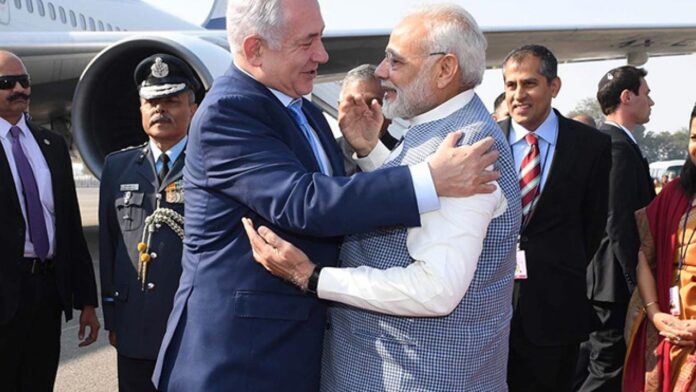
Dinesh Dubey
A week has passed since the horrific attack on Israel by Hamas, the Islamic extremist organisation that has prominently emerged as the face of the movement for a full-fledged nationhood to Palestine, with little or no visible signs for a peaceful solution to the crisis. Israel has decided to move into Northern Gaja for a decisive ground battle. By the time Iran warned Israel to desist from continuing its forward movement in Northern Gaza, about 2700 people have been killed and a treble of this number were badly injured.
At a time when world leaders should have united for establishing peace in the war-ravaged Gaza, the world opinion is apparently divided in condemning or supporting Hamas for its “audacity” in launching a brutal terror attack on Israel, something that the Jewish nation faced 50 years later to the Yom Kippur war of 1973.
While most of the democratic countries of Americas, Europe and Asia have openly condemned Hamas for a well-planned and calculated attack on Israel, and for upsetting the peace process in the Middle-East; majority of Islamic countries have criticised Israel for creating a situation that triggered a deadly attack by Hamas, last Saturday. Most of these countries have tended to insist for a permanent and peaceful solution of the Palestinian issue than unequivocal support for Hamas’ unilateral move to invade Israel. Unfortunately, the thin line separating the Palestinian cause with Hamas’ terrorist act seems to have totally blurred.
All the members of the Group of 7, entire European Union along with its NATO members, and most of the G20 nations are siding with Israel as the victim in the current round of conflict. The United States has come out strongly in condemning the Hamas’ attack. President Joe Biden, referring it as an “appalling assault against Israel” said: “Terrorism is never justified. Israel has a right to defend itself and its people. My administration’s support for
Israel’s security is rock solid and unwavering.” Biden’s reaction was virtually repeated by most of the western democracies.
India’s stand, too, has been highly critical of the role of Hamas despite its longstanding ties with the Palestinian Authority. Replying to a phone call by his Israeli counterpart Benjamin Netanyahu, Prime Minister Modi stated that “People of India stand firmly with Israel in this difficult hour. India strongly and unequivocally condemns terrorism in all its forms and manifestations.”
India and Palestinian Cause
India has traditionally been a staunch supporter of the Palestinian cause since the birth of Israel as a nation. The creation of a separate nation for Jews based on two-state principle in 1948, however, was ensued by a collective war of Arab world on Israel. Mahatma Gandhi, the father of nation, then had said that “Palestine belongs to Arabs in the same sense that England belongs to English and France to French.”
Since very inception, India has sympathised with the Palestinians in all the major Arab-Israel armed conflicts including that of the six-day war in 1967 and Yom Kippur war in 1973. India also mobilised massive support for the Palestinian cause among the countries of Non-Aligned Movement and it’s economic forum, popularly called as Group of 77.
In the course of its opposition to Israel, Indian foreign policy was marked by its anti-Zionism plank in the decades of 1960’s and 70’s. It initially hesitated to recognise Israel and opposed its entry in the United Nations, but formally recognised it in 1950. It allowed the operation of a commercial consulate in Mumbai (1953). About four decades later, India established full diplomatic ties under Prime Minister Narasimha Rao in 1992.
Since then New Delhi had to do a lot of tightrope balancing while engaging both Israel and the Palestinian Authority together. A pivotal moment came in 1999, when Israel sent weapons to India during the Kargil war, which was positively responded by the official visits to Tel Aviv by Home Minister LK Advani and External Affairs Minister Jaswant Singh (2000). Later, Sharad Pawar, Kapil Sibal and Kamal Nath, cabinet ministers in the United Progressive Alliance government, visited Israel to promote the bilateral ties.
India’s Ties with Israel
The India-Israel ties, however, blossomed under the BJP government when Prime Minister Modi became the first Indian head of government to visit Israel. Since then, trade and arms sale have surged and technical cooperation—especially in the fields of agriculture, intel-sharing, counterterrorism and general surveillance expanded. The similarly tough approaches that Modi and Israeli Prime Minister Benjamin Netanyahu are reputed to take toward terrorism, along with their perfect personal chemistry, have immensely contributed to strengthening of ties between the two democracies. That’s why, a terrorism triggered Israel-Hamas war could generate a strong sense of solidarity between Israel and India, which confronted the persistent threat of terrorism for past four decades.
Recent geopolitical developments in the Middle East have bolstered the India-Israel partnership while putting some distance between India and the Palestinians. New Delhi embraced the 2020 Abraham Accord which normalized Israel’s relations with some of its Arab neighbors and enabled the emergence of new initiatives—such as the I2U2 (India, Israel, U.S. and UAE) quad and IMEEC, (India-MiddleEast-Europe Economic Corridor). Multilateral cooperation in the Middle East is important for New Delhi, given its trade interests there and the large Indian diaspora in the Arab Gulf.
India’s relations in the Middle East also align more closely with Israel’s interests than the Palestinians’. Some of India’s top partners in the region—such as Egypt and the UAE have formal relations with Israel, while another—Saudi Arabia— has been brought closer by the U.S. President Joe Biden on a normalization deal before the Israel-Hamas war began. Iran, a Hamas ally, is one of the few Middle Eastern states that has bumps in its relations with India, mainly because New Delhi has its commercial ties with Tehran in deference to U.S. sanctions.
Tightrope Balancing
Despite all this, India can’t afford to give the impression that it’s fully taking Israel’s side. It still supports the two-state solution and in the last few years has voted against Israel in several United Nations resolutions and authorised humanitarian aid to Palestinian refugees. India, for obvious reasons, won’t like to antagonise its key partners in the Middle East that are appalled by the brutality of Israel’s retaliation in Gaza after the Hamas attacks.
Strategic analysts argue that India should keep a low public profile during the war, privately signaling its support to Israel while communicating to Palestinian interlocutors that its expressions of solidarity with Israel are a reaction to Hamas terrorism and not a rejection of the Palestinian cause. Given the reported unhappiness among India’s Arab partners about New Delhi’s refusal to mention Israel’s retaliatory operations in Gaza, an Indian statement calling for de-escalation and dialogue would be helpful under the current circumstances.
Still, expanding India-Israel cooperation and a new war that amplifies shared concerns suggest that India’s long-standing policy of balancing its relations with Israel and the Palestinians could soon face a litmus test.
South Asian countries have responded to the crisis in Israel and the Palestinian territories just as one might expect. The states that do not recognise Israel—Afghanistan, Pakistan, Bangladesh and Maldives—have said less about Hamas’s terrorism, instead highlighting Israel’s brutalities in Gaza, and reiterated calls for a Palestinian state.
Two countries that have formal relations with Israel—Nepal and Sri Lanka—have focused their public messaging more on the Hamas attacks. Nepal’s reaction was similar to India’s, expressing solidarity with Israel. Sri Lanka’s reaction was more balanced than others in the region, expressing concern about deaths in both Israel and Gaza. Bhutan, which also has formal relations with Israel, doesn’t appear to have issued a public reaction to the war.
The Israel-Hamas war could have several direct impacts on South Asian states’ interests. India and Nepal each have a sizable contingent of citizens in Israel. Bangladesh, India, Nepal, and Pakistan have large numbers of workers in the Gulf states, and a wider regional war could impact their security. Bangladesh, India, and Pakistan also depend on the region for oil and gas supplies. There are also some potential internal security threats: Hard-line Islamist parties in Bangladesh and Pakistan that are hostile to Israel may stage protests that could turn violent.
The million dollar question is that in a situation when powerful nations including the U.S., Britain and France, the three permanent members of the United Nations Security Council, are openly siding with Israel and other two — Russia and China — have their own reasons to not focus on the escalating war situation in the Middle East, who will bring the warring parties on the dialogue table? Can India play the role of a peace maker by garnering the diplomatic support from both Arab world and western democracies for a peaceful solution to the raging conflict?


